Are mobile homes worth buying? The choice between a mobile home and a regular home can be perplexing. Mobile homes, also known as manufactured homes, offer an alternative to traditional houses. But what sets them apart?
Are Mobile Homes Worth the Investment?
Mobile homes are built off-site in factories and then transported to mobile home parks or private lots for installation. On the other hand, conventional homes are constructed on-site, adhering to local building codes and regulations. Understanding the key differences between these two types of housing is crucial before making a decision.
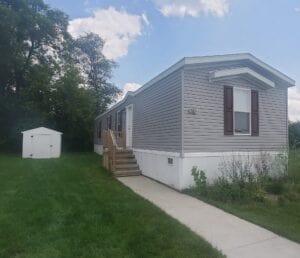
Investing in a mobile home offers advantages such as affordability and flexibility. They provide an opportunity for homeownership without the high costs associated with traditional houses. Mobile homes can be relocated if needed, allowing for greater mobility.
However, it’s essential to consider both the pros and cons when deciding whether a mobile home is worth buying. Factors like construction quality, long-term value, and location play significant roles in determining their desirability.
We’ll explore various aspects that make mobile homes worth considering as an investment while highlighting important terms and considerations along the way.
So let’s dive in and uncover what makes mobile homes stand out in today’s ever-evolving housing market!
Pros of Mobile Homes as an Investment
Lower initial purchase cost compared to regular homes
One of the major advantages of investing in mobile homes is their lower initial purchase cost when compared to traditional houses. Mobile homes are generally more affordable, making them an attractive option for individuals looking to enter the real estate market with a smaller budget. This lower cost allows investors to acquire multiple properties and diversify their portfolio without breaking the bank.
Potential for high rental income due to affordable housing demand
The demand for affordable housing continues to rise, making mobile homes a lucrative investment opportunity. As the cost of living increases, many individuals and families seek out more affordable housing options, and mobile homes provide a solution. By investing in mobile homes, you can tap into this growing demand and potentially generate substantial rental income.
Mobile home parks often have high occupancy rates due to the affordability factor, ensuring a steady stream of tenants and minimizing vacancies. With proper management and maintenance, these properties can yield consistent cash flow over time.
Flexibility in location, allowing for investment opportunities in various markets
Investing in mobile homes offers flexibility in terms of location. Unlike traditional houses that are fixed on a specific piece of land, mobile homes can be easily transported from one place to another. This mobility opens up investment opportunities in various markets and allows investors to capitalize on emerging trends or areas with higher potential returns.
Investors can choose to invest in mobile home parks located near universities or industrial areas where there is a constant influx of potential tenants. Alternatively, they may opt for vacation destinations where seasonal rentals are highly sought after. The ability to adapt your investment strategy based on market conditions gives you greater control over your returns.
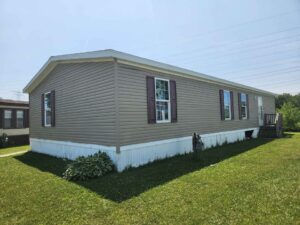
Ability to generate cash flow quickly with shorter turnaround times for renovations or repairs
Another advantage of investing in mobile homes is the relatively shorter turnaround times for renovations or repairs compared to traditional houses. Mobile homes are typically smaller and simpler structures than conventional homes, making them easier to renovate and maintain. This means that you can quickly make necessary improvements and get the property ready for rental or sale, allowing you to start generating cash flow sooner.
Moreover, mobile homes often require less extensive repairs due to their compact size and simpler infrastructure. This not only saves time but also reduces expenses associated with maintenance and renovations.
Cons of Mobile Homes Compared to Regular Homes
Limited appreciation potential compared to traditional houses
One of the major disadvantages of mobile homes when compared to regular houses is their limited appreciation potential. Unlike traditional homes, which tend to increase in value over time, mobile homes often struggle to appreciate at the same rate. This can be attributed to several factors, including the perception that mobile homes are less desirable and the fact that they typically depreciate faster than regular houses.
Mobile homes are often viewed as a lower-quality housing option, which can contribute to their limited appreciation potential. There is a stigma attached to mobile homes, with some people considering them less attractive or even “cheap.” This perception can impact their resale value and make it more challenging for owners to sell their mobile homes at a higher price.
Furthermore, mobile homes tend to depreciate faster than regular houses due to various reasons such as wear and tear, lack of maintenance, and outdated features. While regular houses can benefit from renovations and upgrades that increase their value over time, mobile homes may require significant investments just to maintain their current worth.
Higher risk associated with depreciation over time
Another disadvantage of mobile homes is the higher risk associated with depreciation over time. As mentioned earlier, these structures tend to lose value at a faster rate compared to traditional houses. This means that if you decide to sell your mobile home in the future, you might not be able to recoup your initial investment or make a substantial profit.
The risk of depreciation is particularly significant if you plan on purchasing an older or used mobile home. These properties may already have experienced considerable wear and tear, making them more susceptible to further damage and decreasing in value even faster.
It’s important for potential buyers of mobile homes to carefully consider this aspect before making a purchase decision. If you’re looking for an investment opportunity with long-term appreciation potential, a regular house might be a safer choice.
Challenges in financing options for mobile home investments
Financing a mobile home can also present challenges compared to financing a regular house. Traditional mortgage lenders often have stricter requirements and may be hesitant to provide loans for mobile homes due to the higher risk associated with these properties.
While there are specialized lenders that offer financing options specifically tailored for mobile homes, the terms and interest rates may not be as favorable as those available for regular houses. This can make it more difficult for potential buyers to secure affordable financing, potentially limiting their ability to purchase a mobile home.
Potential difficulties in finding suitable land or park locations for placement
Finding suitable land or park locations for placing a mobile home can be another disadvantage of this housing option. Unlike regular houses that can be built on any residential lot, mobile homes require appropriate spaces designated for their placement.
The availability of such spaces may vary depending on the area you’re interested in living or investing in. In some cases, there might be limited options or restrictions on where you can place your mobile home. This can make it challenging to find a location that meets your preferences and needs.
Even if you do find a suitable park or land, there may be additional fees and regulations associated with living in these communities. It’s essential to thoroughly research and understand the requirements before committing to purchasing a mobile home.
Factors to Consider for Mobile Home Investments
Local Market Conditions and Demand for Affordable Housing Options
When considering whether mobile homes are worth buying, one of the crucial factors to take into account is the local market conditions and demand for affordable housing options. The demand for affordable housing has been on the rise in recent years, with many individuals and families seeking more cost-effective alternatives. Mobile homes can provide a viable solution, particularly in areas where traditional housing prices are soaring.
To determine if investing in a mobile home is a wise decision, it’s essential to research the local market thoroughly. Look at factors such as population growth, employment opportunities, and overall affordability. If there is a high demand for affordable housing in your area, purchasing a mobile home could be a lucrative investment.
Quality and Condition of the Mobile Home Being Considered
Another significant aspect to consider when contemplating mobile home investments is the quality and condition of the property you’re interested in purchasing. Conducting thorough inspections and assessments is crucial to ensure that you’re making a sound investment.
Inspecting both the interior and exterior of the mobile home will help identify potential issues or necessary repairs. Pay close attention to plumbing systems, electrical wiring, roofing conditions, and structural integrity. Check for any signs of water damage or pest infestations that may have an adverse impact on your investment.
Accessibility to Amenities, Transportation, and Employment Opportunities
The location of your potential mobile home investment plays a vital role in determining its worthiness. Consider its accessibility to amenities like grocery stores, schools, healthcare facilities, parks, and recreational areas. Proximity to public transportation options can also be advantageous for potential tenants or future buyers.
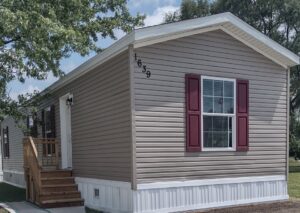
Furthermore, evaluate the availability of employment opportunities nearby. A convenient commute can make your mobile home more appealing to renters or prospective buyers who prioritize proximity to their workplaces.
Regulations and Zoning Restrictions Specific to Mobile Home Investments
Before finalizing any mobile home investment, it’s crucial to familiarize yourself with the regulations and zoning restrictions specific to such properties. Different regions may have varying rules regarding mobile homes, including where they can be located and how they can be used.
Research the local laws and regulations governing mobile homes in your area. Ensure that you comply with all necessary permits and licenses required for renting or selling mobile homes. Understanding these legal considerations will help you avoid potential issues or setbacks down the line.
Comparing Value and Investment Potential: Mobile Homes vs. Manufactured Homes (2022)
Mobile homes and manufactured homes are two popular options for affordable housing. While they may seem similar at first glance, there are key differences that can impact their value and investment potential.
Age Matters: Mobile Homes vs. Manufactured Homes
One of the main distinctions between mobile homes and manufactured homes is their age. Mobile homes are typically older models, often built before 1976 when federal construction standards were established. On the other hand, manufactured homes are newer constructions that meet these updated regulations.
The age factor plays a significant role in determining the value of these homes. Older mobile homes may require more maintenance and repairs due to wear and tear over the years. In contrast, manufactured homes offer more modern features and design elements that appeal to buyers seeking a contemporary living experience.
Appreciation Rates: A Look at Investment Potential
When considering investment potential, it’s essential to examine how these types of homes appreciate over time. Generally speaking, manufactured homes tend to appreciate at a higher rate than mobile homes due to their newer construction standards and desirable features.
Manufactured home communities often have guidelines in place to maintain property values by regulating aesthetics and upkeep within the community. This can contribute to an overall increase in value over time.
On the other hand, mobile home parks may have varying levels of regulation or oversight, which can impact appreciation rates differently across regions. Factors such as location desirability, park management quality, and local housing demand also influence investment potential for mobile homes.
Regional Preferences & Market Trends
Investment potential for both mobile and manufactured homes can vary significantly depending on regional preferences and market trends. Some areas might have a higher demand for affordable housing options like mobile or manufactured homes due to factors such as limited housing supply or a high cost of living.
In certain regions, mobile homes may be more prevalent and have established communities with supportive infrastructure. This can create a stable market for buying and selling mobile homes, making them an attractive investment option.
Manufactured homes, on the other hand, may be more popular in areas where there is a demand for newer, energy-efficient housing options. These homes often offer modern amenities that appeal to buyers seeking comfort and convenience.
Assessing Long-Term Value: Mobile Homes vs. Manufactured Homes
When considering the purchase of a mobile home or a manufactured home, one crucial factor to evaluate is their long-term value. Over time, various factors can impact the value of these properties, including age, wear and tear, outdated features, market demand, location, maintenance, and upgrades.
Mobile homes are typically more susceptible to declining in value compared to manufactured homes due to their age and construction standards. As mobile homes age, they may experience wear and tear that can lead to decreased value. Outdated features in older mobile homes could make them less appealing to potential buyers or renters.
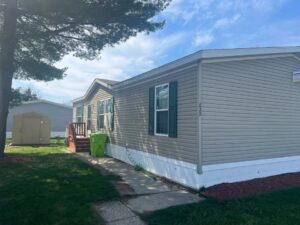
On the other hand, manufactured homes tend to hold their value better because they are constructed according to newer standards. These standards ensure that the homes are built with modern materials and techniques that enhance durability and longevity. As a result, manufactured homes often maintain their appeal for longer periods.
Market Demands: Are Mobile Homes Worth the Investment
Market demand plays a significant role in determining the long-term value prospects for both mobile and manufactured homes. If there is high demand for affordable housing options in a particular area, the value of these properties may increase over time. Conversely, if there is limited demand or an oversupply of similar properties in the market, it could negatively affect their long-term value.
The location of a mobile or manufactured home also influences its long-term value. Properties situated in desirable neighborhoods with good schools, amenities, and proximity to employment opportunities tend to appreciate more over time compared to those located in less desirable areas.
Regular maintenance is essential for preserving the long-term value of any property. This applies equally to mobile homes and manufactured homes. Neglecting maintenance tasks can lead to accelerated wear and tear or even structural issues that could significantly decrease their overall worth.
Strategic Upgrades Mobile Homes
Furthermore, making strategic upgrades can positively impact the long-term value of both types of properties. Upgrading features such as kitchens or bathrooms can enhance their appeal and make them more attractive to potential buyers or renters. Energy efficient upgrades can reduce utility costs, making the property more desirable and potentially increasing its value.
Cost Considerations: Mobile Homes vs. Regular Homes
Lower Purchase Prices for Mobile Homes
When considering the cost of buying a home, mobile homes often come with lower purchase prices compared to regular homes. This can be an attractive factor for those who are on a tighter budget or looking for more affordable housing options. The lower price point allows individuals and families to enter the housing market without breaking the bank.
Upfront Costs for Maintenance and Repairs
One important aspect to consider when comparing mobile homes and regular homes is the upfront costs associated with maintenance and repairs. While mobile homes may have lower initial purchase prices, they may require higher upfront costs for maintenance and repairs due to their unique construction and materials.
Regular homes, on the other hand, typically have more durable materials and a stronger foundation, which can result in fewer immediate repair needs. However, these regular homes may still require occasional maintenance that could incur additional costs over time.
Insurance and Property Taxes
Another significant factor in assessing the cost of homeownership is insurance and property taxes. In general, insurance rates tend to be lower for mobile homes compared to regular homes due to their smaller size and reduced risk factors.
Property taxes also play a role in determining the overall cost of owning a home. Mobile homes generally have lower property tax rates since they are considered personal property rather than real estate. Regular homes, on the other hand, are subject to higher property tax rates based on their assessed value.
Potential Appreciation and Long-Term Value
While mobile homes offer affordability benefits upfront, regular homes have potential advantages in terms of appreciation and long-term value. Regular houses are often located in established neighborhoods with better infrastructure, amenities, and community services. These factors contribute to their potential for greater appreciation over time compared to mobile homes.
Regular houses tend to hold their value better in the long run due to various factors such as location desirability, land ownership, and overall market trends. This can be an important consideration for individuals looking to invest in a property that will provide long-term financial stability.
Conclusion: Are Mobile Homes Worth the Investment
In conclusion, investing in mobile homes can be a worthwhile venture if approached with careful consideration. Understanding the pros and cons, as well as evaluating various factors, is crucial in making an informed decision.
Considering the advantages of mobile homes as investments, such as lower upfront costs, potential for higher rental yields, and flexibility in location, they can present attractive opportunities. However, it is essential to weigh these benefits against the downsides when compared to regular homes. Factors like limited appreciation potential and potential difficulties with financing should be taken into account.
When comparing value and investment potential between mobile homes and manufactured homes in 2022, it becomes evident that both options have distinct characteristics. Assessing long-term value requires evaluating factors like market trends, location desirability, and maintenance costs.
Cost considerations are also significant when deciding between mobile homes and regular homes. While mobile homes offer affordability upfront, ongoing expenses such as lot fees and maintenance should be factored into the equation.
Final Thoughts: Are Mobile Homes Worth The Investment
To make an informed decision about investing in mobile homes, it is crucial to conduct thorough research and due diligence. Explore local market conditions, assess demand for rental properties or resale potential, consider your financial capabilities and goals. Seeking advice from real estate professionals or experienced investors can provide valuable insights.
Remember that investing in any property involves risks; however, with proper knowledge and planning, you can mitigate these risks while maximizing your chances of success. Always stay updated on industry trends and regulations to adapt your strategy accordingly.
Ultimately, whether mobile homes are worth buying depends on your specific circumstances and objectives. By carefully considering the pros and cons outlined earlier along with other relevant factors unique to your situation – such as budget constraints or investment horizon – you will be better equipped to make a confident decision.
So take charge of your investment journey today! Explore the possibilities that mobile home investments offer by thoroughly evaluating their potential within your local market. With the right approach and informed decision-making, mobile homes can be a lucrative addition to your investment portfolio.
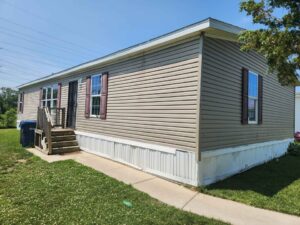
FAQs: Are Mobile Homes Worth the Investment
1. Can I finance the purchase of a mobile home?
Yes, financing options are available for mobile homes. However, it is important to note that obtaining financing for mobile homes can be more challenging compared to traditional homes. Lenders may have stricter requirements and higher interest rates due to perceived risks associated with mobile home investments.
2. Are mobile homes a good option for rental properties?
Mobile homes can be a viable option for rental properties due to their lower upfront costs and potential for higher rental yields. However, it is essential to thoroughly assess the demand for rental properties in your target market and consider factors such as location desirability, tenant demographics, and maintenance costs before making a decision.
3. What are some potential drawbacks of investing in mobile homes?
Some potential drawbacks of investing in mobile homes include limited appreciation potential compared to regular homes, challenges with financing, and possible difficulties with reselling due to stigma or market conditions. Ongoing expenses such as lot fees and maintenance costs should be considered.
4. How do I determine the value of a mobile home?
The value of a mobile home can be determined by considering factors such as its age, condition, location desirability, amenities offered, and comparable sales in the area. Consulting with real estate professionals or appraisers specializing in manufactured housing can provide valuable insights into determining the value of a specific mobile home.
5. What should I look for when buying a used mobile home?
When buying a used mobile home, it is essential to conduct thorough inspections to assess its condition carefully. Look for signs of structural integrity issues, water damage, electrical or plumbing problems, and any necessary repairs or renovations that might affect its value or livability.
Remember that these FAQs are just starting points; it is important to conduct further research and consult with professionals before making any investment decisions.
You might also be interested in our articles:

